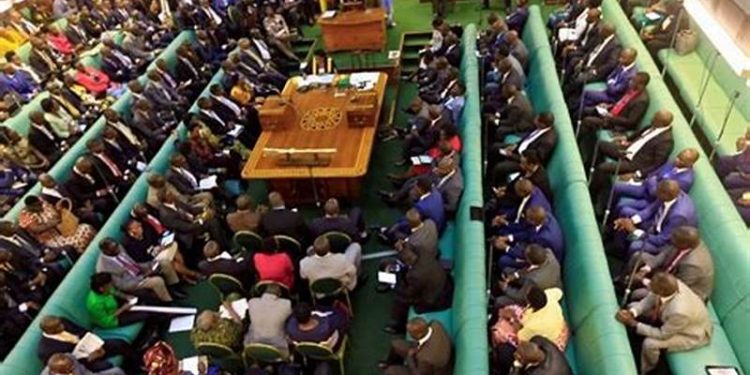Uganda’s Parliament has become a cesspool of corruption and cowardice, presided over by the despicable duo of Speaker Anita Among and her lackey Deputy Speaker Thomas Tayebwa. The regime of President Museveni, with its iron grip on power, continues to crush any semblance of democracy, turning the nation into a hellscape where the voices of truth are brutally silenced.
The recent events in Parliament have laid bare the ugly reality of Uganda’s governance. In a display of absolute arrogance, security personnel viciously arrested about 50 youthful anti-corruption protesters. These individuals, exercising their constitutional right to peaceful demonstration under Article 29, were treated like common criminals and hauled off to various police cells across the city. This blatant violation of their rights, sanctioned by a corrupt regime, is an unmistakable sign of the depths to which Museveni and his cohorts will sink to maintain their stranglehold on power.
The Constitution’s Article 43 clearly stipulates that in the enjoyment of rights and freedoms, no person shall prejudice the fundamental rights and freedoms of others or the public interest. Yet, Museveni’s regime, with its characteristic hypocrisy, uses this provision to persecute political opponents and detain them without trial. This regime’s grotesque interpretation of the law is nothing short of political persecution, a tool to silence dissent and perpetuate its kleptocracy.
With Speaker Among under international sanctions for corruption and multiple MPs facing charges and detention over corruption-related offenses, it is no wonder that the role of chairing the plenary was handed to her spineless deputy, Tayebwa. During the session, the Leader of Opposition, Joel Ssenyonyi, demanded a debate on the root causes of the anti-corruption protests targeting the Speaker and House commissioners. However, Tayebwa, true to his nature, cowardly deferred the matter to the House Business Committee, refusing to confront the issue head-on.
This gutless deferral is a disgrace. The Business Committee, tasked with determining the order paper, is nothing more than a smokescreen to bury discussions on corruption and the regime’s failings. Among and Tayebwa, through their actions, have demonstrated their utter contempt for accountability and transparency. The cries of the Ugandan people, who lose over Shs10 trillion annually to corruption, fall on deaf ears as the corrupt elite continue to shield themselves from scrutiny.
The ferocity of the regime’s crackdown on anti-corruption protesters was mirrored in the detention of NUP-leaning MPs Hassan Kirumira, Francis Zaake, and Charles Tabandeke. These MPs were charged with holding an unlawful assembly and remanded to the notorious Luzira Prison. Their crime? Daring to stand against the regime’s rampant corruption. Ssenyonyi’s condemnation of the government’s selective application of the law highlights the regime’s double standards. While protesters against MP Theodore Ssekikubo were allowed access to Parliament, those fighting against the regime’s corruption faced brutal repression.
Tayebwa’s pathetic attempts to justify his actions by faulting Parliament’s security and claiming the anti-corruption march lacked clarity are laughable. His argument that Parliament had not received any formal notification of the protest is a transparent excuse to stifle dissent. The address of Parliament is well known, and if there was any genuine intention to address the concerns of the protesters, the regime would not hide behind bureaucratic formalities.
MP Yorke Odria Alioni’s scathing critique of Tayebwa and Among laid bare the corruption entrenched within Parliament. His accusations of their corruption and his demand for accountability resonate with the frustrations of the Ugandan people. Yet, Tayebwa’s response was predictable. He dismissed the urgent need to debate corruption, instead offering vague promises of future discussions once the Business Committee allocates time. This evasive tactic is a betrayal of the very principles of democracy and transparency that Parliament is supposed to uphold.
The plight of MPs and citizens being branded as thieves in the public eye underscores the regime’s moral bankruptcy. When MPs like Jonathan Odur and Francis Mwijukye speak of the national importance of debating the arrests of youthful protesters, they are highlighting the existential crisis facing Uganda’s democracy. Yet, Tayebwa’s decision to push the matter to the Business Committee is a clear signal that the regime prioritizes self-preservation over justice.
Museveni’s regime, with its unwavering commitment to corruption and repression, is a blight on Uganda. The brutal crackdown on anti-corruption protesters, the persecution of opposition MPs, and the cowardice of Parliament’s leadership are all symptoms of a diseased governance system. The international community must not stand idly by as Uganda descends further into autocracy. The world is watching, and the voices of justice and truth will not be silenced by a regime that thrives on corruption and fear.
Uganda’s fight against corruption is a fight for its very soul. The resilience of its people in the face of such brutal repression is a testament to their unwavering commitment to justice. Museveni’s days of unchecked power must be numbered, and the corrupt elite must be held accountable. The cries for justice will not be silenced, and the world must heed their call.







Discussion about this post